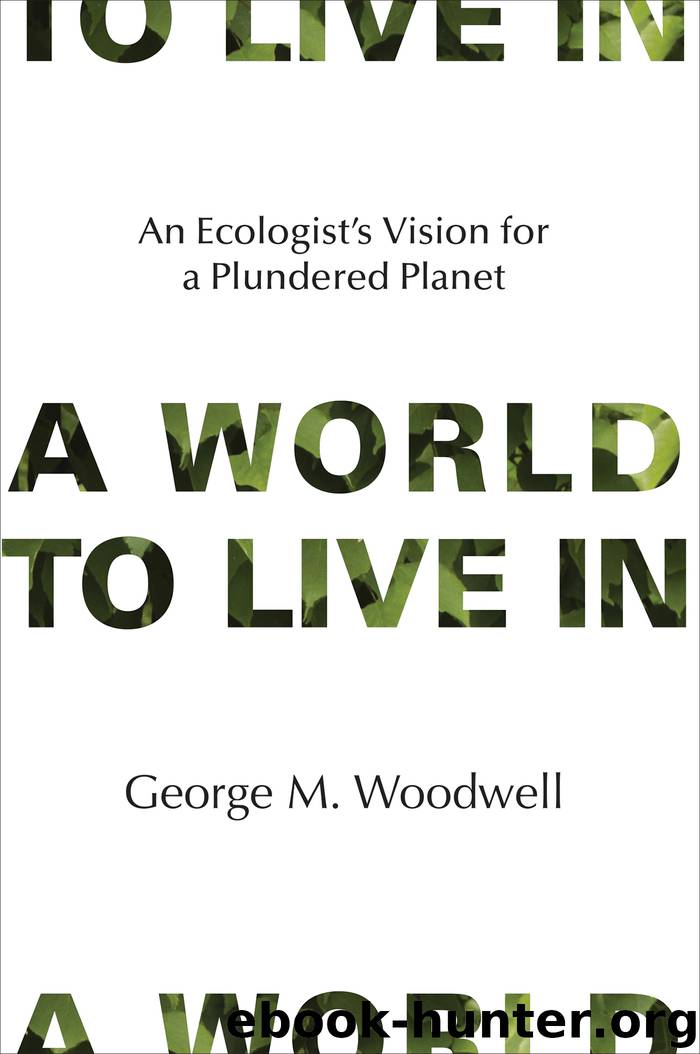A World to Live In by George M. Woodwell

Author:George M. Woodwell
Language: eng
Format: epub
Publisher: The MIT Press
Published: 2016-03-30T16:00:00+00:00
8
The Limits of Biodiversity
I celebrate myself, and sing myself,
And what I assume you shall assume,
For every atom belonging to me as good belongs to you.
—Walt Whitman, Song of Myself
The terror engendered by nuclear weapons was balanced in part during the two decades following their use in war by the widely shared anticipation of abundant cheap energy from the atom to drive industrial development globally. The focus of attention turned to governmental alliances with corporate industrial interests. It was easy at that time to slip into the view that cheap energy is a universal good, capable of use to cure virtually any political or economic ill.
I, too, was trapped in this popular view, and considered a major subsidy to nuclear businesses, the Price-Anderson Act limiting industrial and governmental liability in a serious accident, as a wise and necessary step into the new world. My experience was limited, of course, although it did at that point include two years at sea on a naval oceanographic vessel, a steel-hulled diesel “ecosystem,” entirely dependent on those deep-down bunkers, tanks of diesel oil, energy. Oil made everything possible, not only mobility, but also lights, heat, freshwater, and air in confined quarters as well as compass, radio, ballast, and pumps. It was that energy, thousands of gallons of it, that kept the ship more or less stable and afloat in the North Atlantic storms that we seemed to seek out to test our mettle as we explored from above the monstrous mountains of the Mid-Atlantic Ridge, then new to science and the public. We were not a good example for we were squandering the future, heedlessly extruding our abundant wastes to float off or sink into an apparently limitless sea, one ship among thousands on the oceans with the same callous scorn for simple manners.
Despite the compelling lessons from the weapons tests, the hard news about the biotic hazards of nuclear weapons, and how their wastes accumulate and circulate widely to become hazards to all, the health of the biotic environment was, for the moment at least, set aside by science, government, and business. It was forgotten. The objective was economic growth, and the prospects seemed unlimited.
It proved to be an unfortunate oversight.
The scientific community, at least part of it, participated with enthusiasm. Democratic capitalism seemed to offer nearly unlimited possibilities in construction and engineering, and in bending the world to suit expanding human interests, aspirations, and numbers. Some biologists, however, were increasingly sensitive to the explosion of the human enterprise into a biosphere whose limits were already being tested. After all, thoughtful scholars were realizing then that our civilization spans at most a few thousand of earth’s four-billion-year history. Life itself is an anomaly, and humans are a recent arrival, new and potentially short-term guests in a biosphere owned and operated by the joint efforts of tens of millions of species too numerous to count. The evolution of life over the four billion years of the planet’s existence, and especially over the most recent five hundred million years, built the environment of all life as we know it.
Download
This site does not store any files on its server. We only index and link to content provided by other sites. Please contact the content providers to delete copyright contents if any and email us, we'll remove relevant links or contents immediately.
Man-made Catastrophes and Risk Information Concealment by Dmitry Chernov & Didier Sornette(6005)
The Revenge of Geography: What the Map Tells Us About Coming Conflicts and the Battle Against Fate by Kaplan Robert D(4066)
Zero Waste Home by Bea Johnson(3833)
COSMOS by Carl Sagan(3617)
Good by S. Walden(3548)
In a Sunburned Country by Bill Bryson(3536)
The Fate of Rome: Climate, Disease, and the End of an Empire (The Princeton History of the Ancient World) by Kyle Harper(3055)
A Wilder Time by William E. Glassley(2858)
Camino Island by John Grisham(2794)
Organic Mushroom Farming and Mycoremediation by Tradd Cotter(2688)
The Ogre by Doug Scott(2679)
Human Dynamics Research in Smart and Connected Communities by Shih-Lung Shaw & Daniel Sui(2500)
Energy Myths and Realities by Vaclav Smil(2487)
The Traveler's Gift by Andy Andrews(2457)
9781803241661-PYTHON FOR ARCGIS PRO by Unknown(2365)
Inside the Middle East by Avi Melamed(2349)
Birds of New Guinea by Pratt Thane K.; Beehler Bruce M.; Anderton John C(2249)
A History of Warfare by John Keegan(2239)
And the Band Played On by Randy Shilts(2197)
